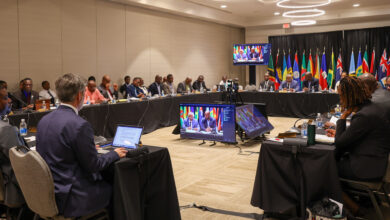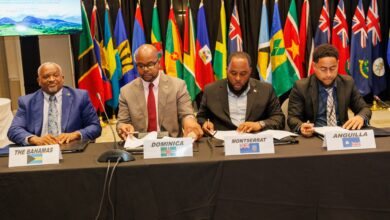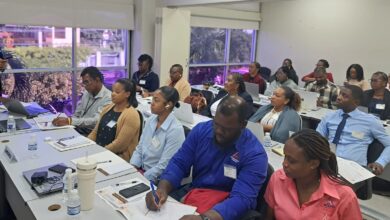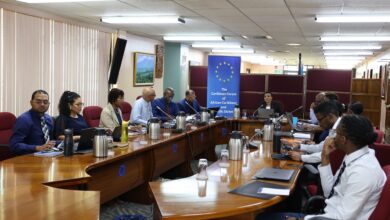BARBADOS’ TRADE MINISTER TO PLAY KEY ROLE IN WTO MINISTERIAL SUMMIT
CHRIST CHURCH, BARBADOS – Minister of Foreign Affairs and Foreign Trade of Barbados Dame Billie Miller was elected by the World Trade Organization (WTO) General Council Friday (July 29) as a Vice-Chair in the bureau of the Chair of the Sixth WTO Ministerial Conference, to be held in Hong Kong this December.
Secretary for Commerce, Industry and Technology of Hong Kong, China Mr. John Tsang was elected at the General Council meeting to serve as Chair of the Ministerial Conference.
Dame Billie Miller is one of three vice-chairpersons to have been elected.
Director General of the Caribbean Regional Negotiating Machinery (RNM) Ambassador Dr. Richard Bernal congratulated the Senior Barbadian Minister on her election, noting that “Minister Miller will provide strong leadership in the Conference Chair’s bureau, in what will be a crucial Ministerial for troubled Doha Round talks.”
The General Council was also informed Friday of the four deputies that incoming WTO Director General Pascal Lamy (who takes over September 1) has chosen. They hail from Chile, Rwanda, India and the United States, respectively. Their terms of office will begin October 1.
These announcements come against the backdrop of efforts last week to reach an interim agreement for Doha Round talks referred to as “First Approximations”, which fell short. Members struggled to bridge rifts, but ultimately consensus could not be arrived at in key areas; and as a result the process which was initiated following the Decision adopted by the General Council on August 1, 2004 to advance modalities for Doha Round talks stalemated.
There is uncertainty as to the way forward, as this interim agreement was expected to be the basis for advancing talks ahead of the looming December WTO Ministerial Conference.
In the lead up to this month’s General Council meeting, which had previously been seen as the occasion to clinch “First Approximations”, various WTO Members had signalled that it would be difficult to arrive at agreement over “approximations” (see RNM PRESS RELEASE 1005), negotiations for which have been logjammed primarily over Agriculture and non-Agricultural Market Access (NAMA) – especially over tariff-cutting formulas for agricultural and industrial goods, but also reduction commitments in trade-distorting domestic support in respect of Agriculture.
As it has for some time now, movement in NAMA hinged on progress in the contentious area of Agriculture in last weekend’s consultations involving a dozen key players – which never came. Over the course of those few days, intense consultations took place in an effort to bridge differences in the area of Agriculture, but ultimately they broke down over the structure of the formula itself. The Chair of Agriculture talks Tim Groser (who is to be replaced August 1 by new New Zealand Ambassador Crawford Falconer, the consensus candidate as Chair of the agriculture negotiations and the Cotton Sub-Committee) reportedly expressed doubts in the wake of last weekend’s marathon consultations over whether those talks that took into consideration a number of proposals could go forward, in an attempt to prepare for “First Approximations”. Early last week, both the Agriculture and NAMA Chairs reported in two separate informal meetings that the parties remained apart on the major issues.
The July Approximation was presented to last week’s Trade Negotiations Committee (TNC) and subsequent General Council meetings as ‘status reports.’ Ultimately, the latter body had nothing to approve.
Despite the fact that the “First Approximations” exercise has come up short, in his final report as TNC Chairman WTO Director General Supachai Panitchpakdi said to Members on July 28 that achieving a successful Ministerial Conference this December is still possible, provided they dedicate themselves to “a politically engaged, results oriented, decision making mode of operation immediately after the (summer) recess.”
While he endorsed Dr. Supachai’s call for the level of ambition for the Hong Kong Ministerial to remain high, Ambassador Bernal was more circumspect about the outcome of last week’s high-level meetings, characterizing the current state-of-affairs as “disappointing, but not altogether unexpected.” He cautioned that developments in relation to Geneva-based talks over the last few days do not auger well for December’s Ministerial, but stressed that given the nature of the outcome, “Members perhaps have a clearer idea of the political decisions that have to be made on the technical issues at the heart of areas like Agriculture that are holding up momentum, in order to revive talks and for negotiations on modalities to progress meaningfully in advance of December.”
BarbadosPress ReleasesTradeWorld Trade Organisation





